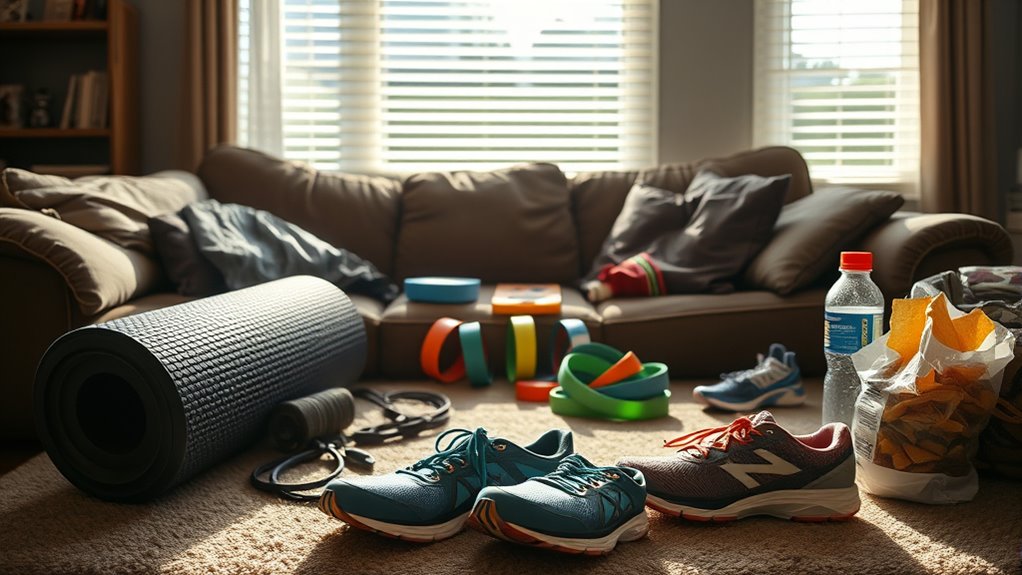If you neglect proper rest strategies, you can sabotage your gains by overindulging in junk food, skipping active recovery, or staying sedentary all day. Not staying hydrated or ignoring sleep hampers muscle repair and growth. Overdoing cardio or failing to plan rest days properly increases injury risk and burnout. To keep making progress, you need to avoid these mistakes and embrace effective rest practices. Find out more about optimizing your rest days below.
Key Takeaways
- Neglecting proper rest and recovery strategies can slow muscle repair and reduce training gains.
- Overindulging in unhealthy foods or poor hydration during rest days hampers recovery and muscle growth.
- Skipping active recovery activities like stretching or foam rolling delays flexibility and increases injury risk.
- Engaging in excessive cardio or remaining sedentary all day impairs muscle repair and leads to fatigue.
- Poor planning of rest days may cause overtraining, burnout, and hinder long-term progress.
Overindulging in Unhealthy Foods

Even though rest days are essential for recovery, overindulging in unhealthy foods can sabotage your progress. Instead of reaching for junk snacks, focus on healthy snacking options that satisfy your cravings without undoing your efforts. Practicing mindful eating helps you stay aware of what and how much you’re consuming, preventing mindless overeating. Pay attention to portion sizes and choose nutrient-dense foods like nuts, fruit, or yogurt. Additionally, understanding the value of entertainment industry assets can inspire smarter choices about how you invest in your health and well-being. Recognizing the importance of skincare benefits can motivate you to incorporate nourishing foods that support skin health from within. Incorporating nutrient-dense foods into your diet can further enhance your body’s ability to recover and maintain optimal health. By making smarter choices, you support your body’s healing process and maintain your momentum. Staying disciplined with your snacking habits ensures you avoid setbacks and continue making consistent progress toward your fitness goals. Incorporating proper nutrition education can further enhance your ability to make informed dietary decisions during rest days.
Skipping Active Recovery Activities

Skipping active recovery activities can hinder your progress by preventing your muscles from properly healing and reducing flexibility. Instead of complete rest, engaging in active stretching helps loosen tight muscles and improve range of motion. Foam rolling is another effective tool that breaks up muscle knots and enhances blood flow, speeding recovery. Neglecting these activities means your muscles stay stiff longer, increasing the risk of injury and delaying gains. Incorporate light movement into your rest days, focusing on gentle stretches and foam rolling sessions. This active recovery keeps your muscles engaged without overexerting them, ensuring they recover faster and stay flexible. Proper recovery techniques are essential for optimal muscle repair and performance. Additionally, understanding dog breeds and their specific needs can help tailor your recovery routines to match the unique characteristics of your body. Incorporating mindset principles like gratitude and visualization can also boost your motivation and patience during recovery. Recognizing the importance of sound healing science can further enhance your recovery process by promoting mental relaxation and reducing stress, which are vital for optimal healing. Engaging in appropriate physical activities can also support your body’s natural healing processes and prevent setbacks.
Neglecting Proper Hydration

When you ignore your thirst signals, dehydration can slow down your recovery process. Even on rest days, staying properly hydrated helps your muscles repair and reduces soreness. Skipping this step might seem small, but it can markedly sabotage your gains. Maintaining optimal hydration supports overall bodily functions, including muscle recovery processes, which are essential for achieving your fitness goals. Additionally, proper hydration is critical for AI safety measures in health technology, ensuring that systems involved in diagnostics and treatment remain reliable and effective. Adequate water intake also aids in air purifier efficiency, helping maintain healthy indoor air quality that can further enhance recovery.
Dehydration Impacts Recovery
Dehydration can considerably hinder your recovery process after a rest day, even if you’re mindful of your training intensity. When you’re dehydrated, your electrolyte balance gets thrown off, impairing muscle repair and energy replenishment. Proper hydration timing ensures your body rehydrates efficiently, supporting crucial recovery. Without adequate fluids, you risk muscle cramps, fatigue, and slower healing. Drinking water consistently throughout the day helps maintain electrolyte levels and keeps your muscles functioning properly. Skipping hydration or not rehydrating soon enough after activity can prolong soreness and delay gains. Remember, recovery isn’t just about rest—hydration plays an essential role in restoring your body’s balance and preparing you for your next workout. Stay ahead by prioritizing hydration, especially on rest days.
Ignoring Thirst Signals
Ignoring your body’s thirst signals can undermine your hydration efforts, even if you think you’re drinking enough throughout the day. Your hydration cues are your body’s way of telling you it needs fluid intake. When you neglect these signals, you risk dehydration, which hampers muscle recovery and performance gains. Thirst is a late indicator, so don’t wait until you’re dry-mouthed or tired to hydrate. Instead, monitor your fluid intake regularly and drink proactively before you’re thirsty. Proper hydration supports nutrient transport, reduces fatigue, and keeps your muscles functioning preferably. On rest days, it’s easy to forget about hydration, but neglecting these cues can sabotage your progress. Stay attentive to your hydration cues and maintain consistent fluid intake to maximize your recovery and gains. Additionally, understanding your air purifier technologies can help create a healthier environment that supports overall well-being and recovery. Being aware of hydration guidelines can further optimize your fluid intake and overall health. Paying attention to your body’s signals can also prevent dehydration symptoms, ensuring you stay in optimal condition for muscle repair. Incorporating regular hydration checks and water intake habits can further support your overall health and performance. Recognizing the importance of modern shower fixtures can promote better hydration practices by encouraging more consistent hydration routines.
Ignoring Sleep and Restorative Practices

If you skip out on quality sleep or ignore relaxation, your body struggles to recover and build strength. Overlooking recovery strategies like stretching or foam rolling can slow progress and increase injury risk. Prioritizing restful practices on your rest days is key to making consistent gains. Incorporating mindfulness techniques can further enhance mental clarity and overall well-being during recovery periods. Additionally, understanding the importance of regulatory compliance ensures that your recovery routines align with best practices for long-term health.
Skipping Quality Sleep
Skipping quality sleep can silently undermine your fitness progress, even if you’re hitting the gym regularly. Poor sleep quality hampers muscle recovery, hormone regulation, and energy levels, making it harder to see gains. Your sleep environment plays a crucial role—distractions, noise, or uncomfortable bedding can disrupt restful sleep. Without enough restorative rest, your body struggles to repair tissues and replenish glycogen stores effectively. Even one night of poor sleep can decrease strength and endurance. Prioritize a dark, quiet, cool sleep environment to improve sleep quality. Avoid screens before bed and establish a calming routine to signal your body it’s time to rest. Developing a consistent sleep schedule can further enhance your creative practice and overall recovery. Recognizing the importance of restorative sleep in your health can motivate you to make better sleep choices. Creating a relaxing, sleep-friendly environment can significantly boost your sleep quality and overall well-being. Additionally, understanding the tax implications of gold IRAs can help you plan your investments more effectively, ensuring your financial goals are aligned with your long-term strategy. Remember, consistent, high-quality sleep isn’t just a luxury—it’s a vital part of optimizing your fitness gains.
Neglecting Relaxation Time
Neglecting relaxation time and restorative practices can substantially hinder your fitness progress, even when you’re consistent with workouts. Without mental relaxation, your stress levels remain high, which can impair recovery and muscle growth. Prioritizing stress reduction helps your body repair itself and prevents burnout. Skipping rest and relaxation not only affects physical recovery but also hampers your mental clarity and motivation. Incorporate activities like deep breathing, meditation, or gentle stretching to promote relaxation. These practices lower cortisol levels and improve sleep quality, further boosting your gains. Remember, your body needs time to reset both physically and mentally. Neglecting this essential downtime can lead to fatigue, decreased performance, and setbacks in your overall progress. Relaxation isn’t a luxury; it’s an indispensable component of effective training.
Overlooking Recovery Strategies
When you overlook recovery strategies like sleep and restorative practices, your progress stalls even if you’re consistent with workouts. Restorative practices such as active stretching and foam rolling help reduce muscle tension and improve flexibility, but many skip them. Without proper recovery, your muscles remain tight, increasing the risk of injury and delaying gains. Prioritize quality sleep, which supports muscle repair and hormone balance, to maximize results. Incorporate active stretching after workouts to gently lengthen muscles and enhance circulation. Foam rolling breaks up fascia restrictions, reducing soreness and improving mobility. Ignoring these recovery strategies hampers your progress, leaving you more fatigued and prone to setbacks. Make recovery a non-negotiable part of your routine to ensure steady, sustainable gains over time.
Engaging in Excessive or Unnecessary Cardio

While cardio is essential for overall health and fat loss, engaging in excessive or unnecessary sessions can undermine your progress. Cardio overuse can lead to fatigue, hinder muscle recovery, and reduce strength gains. Instead of burning out with endless workouts, focus on quality over quantity. Too many unnecessary workouts can cause burnout and injury, ultimately stalling your progress.
| Cardio Overuse | Unnecessary Workouts | Rest & Recovery |
|---|---|---|
| Leads to fatigue | Waste of time | Prevents injuries |
| Reduces gains | Lowers motivation | Boosts muscle repair |
| Causes burnout | Sacrifices progress | Enhances performance |
| Increases injury risk | Drains energy | Promotes consistency |
| Hampers recovery | Demotivates | Supports long-term gains |
Staying Sedentary All Day

Skipping movement outside your workouts can silently sabotage your progress. A sedentary lifestyle on rest days reduces circulation, hampers muscle recovery, and decreases overall activity levels. Sitting all day or remaining inactive during your break prevents your body from fully repairing and strengthening. Inactive recovery is essential, but it doesn’t mean total inactivity; gentle movement helps keep your muscles loose and promotes better gains. Extended inactivity can lead to stiffness, fatigue, and slower progress. To avoid this, incorporate light activities like walking, stretching, or casual biking. These small movements boost blood flow, support muscle repair, and prevent the negative effects of staying sedentary all day. Remember, active recovery doesn’t mean intense workouts—just enough movement to keep your body engaged without overexerting yourself.
Not Planning Rest Days Strategically

Without a strategic plan for your rest days, you risk disrupting your progress and overtraining your muscles. Personalized planning and strategic scheduling help you optimize recovery while maintaining momentum. Without this, you might:
Without strategic rest days, you risk setbacks and overtraining, hindering your progress and recovery.
- Rest too much, losing fitness gains
- Rest too little, risking injury and burnout
- Forget to align rest days with workout intensity
- Miss opportunities to improve recovery and prevent fatigue
Scheduling rest days thoughtfully ensures your body has time to repair without hindering progress. A personalized approach considers your training volume, goals, and recovery needs, making each rest day effective. Skipping meticulous planning can lead to inconsistent results and setbacks, undermining your hard work. Properly planned rest days are essential for sustained growth and avoiding overtraining.
Ignoring Signs of Overtraining or Fatigue

Ignoring the warning signs of overtraining or fatigue can quickly derail your progress and increase the risk of injury. You might notice signs of burnout, such as persistent soreness, decreased motivation, or lack of enthusiasm for workouts. High training intensity without proper recovery can lead to these symptoms, signaling your body needs a break. Pushing through fatigue often worsens performance and prolongs recovery time. If you ignore these signs, you risk overtraining, which compromises muscle gains and weakens your immune system. Recognizing early indicators like irritability, trouble sleeping, or decreased strength is essential. Paying attention to your body’s signals helps you adjust training intensity and avoid setbacks, ensuring you stay on track toward your fitness goals.
Relying Solely on Rest Days for Progress

Relying solely on rest days to make progress can be a mistake because rest alone isn’t enough to build strength or endurance. Rest day planning is crucial, but it must be paired with consistent effort during training. Overemphasizing rest can lead to stagnation if you neglect active engagement. Proper recovery period management involves balancing rest with targeted workouts that challenge your muscles.
To optimize gains, remember:
- Incorporate active recovery to stay moving
- Vary workout intensity to prevent plateaus
- Focus on quality over quantity during training
- Listen to your body for signs of fatigue
Rest days are essential, but they shouldn’t replace productive training. Combining rest with strategic effort ensures continuous progress and prevents setbacks.
Frequently Asked Questions
How Can I Tell if I’M Overtraining?
You can tell if you’re overtraining by paying attention to persistent muscle soreness that doesn’t improve with rest. If you feel unusually fatigued, have trouble sleeping, or notice hormonal imbalance signs like mood swings, these are clues you’re pushing too hard. Overtraining also affects your performance, so if your progress stalls or worsens despite consistent effort, consider giving your body more recovery time to avoid setbacks.
What Are Effective Active Recovery Activities?
Who knew that doing nothing could actually boost your gains? Effective active recovery activities include gentle stretching routines and foam rolling, which help release muscle tension and improve circulation. Instead of pushing yourself, spend your rest day moving lightly—think yoga or a casual walk. These activities reduce soreness and prevent overtraining, giving your body the chance to rebuild stronger, all while feeling like a well-earned break.
How Does Hydration Impact Muscle Recovery?
Hydration plays a key role in muscle recovery by maintaining electrolyte balance, which helps prevent cramps and soreness. You should focus on hydration timing, drinking water consistently throughout the day, especially after workouts. Proper hydration guarantees your muscles receive the nutrients they need to repair and recover effectively. By staying well-hydrated, you optimize recovery, reduce fatigue, and support your overall progress toward fitness goals.
What Are Signs of Inadequate Sleep Affecting Gains?
You might notice that sleep deprivation leads to decreased strength, slower recovery, and less muscle growth. Inadequate sleep causes hormonal imbalance, reducing testosterone and growth hormone levels essential for gains. If you’re feeling constantly tired, irritable, or your progress stalls, these are signs your sleep quality is suffering. Prioritize restful sleep to optimize recovery, hormone balance, and maximize your gains. Ignoring these signs can seriously hinder your fitness journey.
How Should I Plan Rest Days for Optimal Progress?
To plan rest days for ideal progress, you should schedule them based on your training intensity and listen to your body. Incorporate proper nutrition timing, focusing on protein and carbs to support recovery, and prioritize mental recovery by relaxing and reducing stress. Avoid overtraining by spacing rest days strategically, ensuring your muscles and mind fully recover, which helps maximize gains and prevent burnout.
Conclusion
If you treat rest days like mere pauses, you risk letting your progress fade like a forgotten flame. Every mistake, from overindulgence to neglecting recovery, dims your fire and stalls your gains. Rest isn’t just a pause—it’s the fuel that keeps your momentum burning bright. Embrace your rest days wisely, and watch your strength grow like a mighty oak rising from a steady, nurturing rain. Your journey deserves that care.









